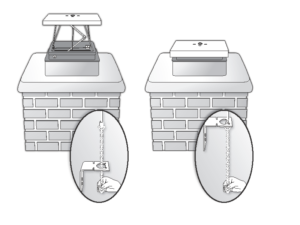
There are also chimney specialists who service chimneys every day, and have seen just about everything during their many years in the field. Usually, you find that some the most reputable chimney specialists offer other services such as roofing, roof repair, and masonry. Expertise in all of these areas gives the specialist a broader knowledge and big picture mentality – which is what homeowners need in order to save time and money over the long haul.
The damper is one of the most important features of a chimney or fireplace because it’s all about energy savings. When your fireplace is in use, the warmth of the fire is adding valuable heat to your home while the smoke and carbon dioxide vents safely up the chimney and into the great outdoors. But when the fireplace is not being used, the warm air in the house is leaking through the chimney and likewise venting into the atmosphere – unless the damper is closed. This is the part of the chimney that seals it off from the fireplace, in order to prevent air flow between the interior of the house and the outdoors. If you live in a state like New Jersey where winters are frigid, keeping your house warm is a significant monthly expense, and it’s vital for the comfort of everyone in your home. There’s no way you can afford to have warm air flowing up the chimney.
Yet even sometimes when a damper is closed, it may not create a good seal. Warm are still might be escaping – and this is a situation in which a chimney repair specialist should be called in to have a look at the problem. In many cases, you’ll be looking a simple repair that can often be preformed on the spot, and won’t cost much. There are also some cases where the damper is badly damaged and may need to be replaced, which any good specialist should also be able to do for you. This may take a day or two, depending on the dimensions of your chimney/fireplace and whether the damper is a part that’s easy to obtain. But if your contractor has been in the business awhile, and is a skilled operator, you should expect results to be relatively quick, and at a cost that competes with anyone else in the market. This is what it’s a great idea to have your chimney inspected and repair in the warmer months – it gives you more freedom to seek multiple bids and choose the best one.
